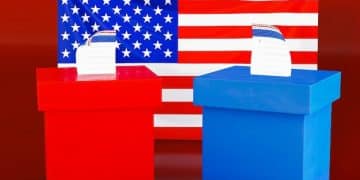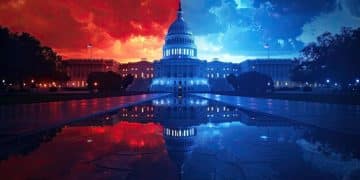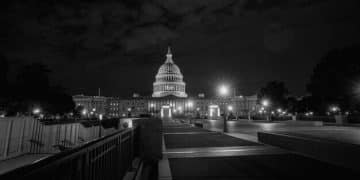Campaign Finance Probe: Unpacking Its Far-Reaching Consequences
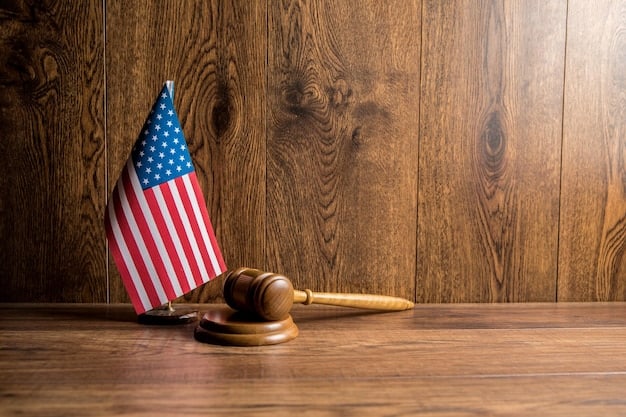
The ongoing investigation into campaign finance reform in the United States could profoundly reshape political landscapes, influencing everything from legislative priorities to voter trust and the very structure of future elections.
The intricate web of campaign finance in the United States stands as a perpetual subject of debate, scrutiny, and often, investigation. Beyond the immediate headlines, understanding what are the potential consequences of the ongoing investigation into campaign finance reform requires a deep dive into its multifaceted implications for American democracy, political parties, and the electorate at large.
The Foundational Impact on Political Parties and Election Cycles
Any significant probe into campaign finance inherently targets the lifeblood of political campaigns: money. The flow of funds underpins everything from grassroots organizing to large-scale media expenditures, influencing how parties operate and strategize for future elections.
When an investigation unfolds, it creates an environment of uncertainty and vulnerability for parties and candidates. This can lead to a fundamental shift in fundraising tactics and expenditure patterns, as entities become more cautious to avoid impropriety. The immediate consequence often involves a slowing down of traditional fundraising efforts as donors and recipients alike become wary of increased scrutiny.
Altering Fundraising Strategies
Investigations force parties to re-evaluate their reliance on certain types of donations, especially from large corporations, wealthy individuals, or political action committees (PACs). This introspection can lead to a pivot towards smaller, grassroots donations, or force parties to seek alternative funding mechanisms.
- Increased emphasis on small-dollar donors and online fundraising platforms.
- Greater transparency in reporting donations and expenditures.
- Potential for stricter internal compliance protocols within party organizations.
- Diversification of funding sources to mitigate risks associated with controversies.
Furthermore, the investigation’s shadow can reshape how candidates approach their campaigns. Those perceived as benefiting from questionable finance practices may face significant reputational damage, irrespective of guilt. This can force candidates to distance themselves from certain donors or even alter their policy positions to align with public sentiment regarding campaign finance probity.
The prolonged nature of such investigations can also impact election cycles by diverting resources, both financial and human, away from core campaign activities. Legal fees, compliance officers, and public relations efforts become necessary expenditures, pulling funds and attention from voter outreach and policy messaging. This shift can disrupt planned campaigns and potentially alter election outcomes in closely contested races.
Legislative and Regulatory Shifts: The Tides of Reform
One of the most profound potential consequences of an ongoing campaign finance investigation is its capacity to catalyze legislative and regulatory reform. Historical precedent shows that major scandals or widespread concerns about money in politics often precede significant overhauls of election laws. This investigation is no different; it creates a fertile ground for renewed calls for change.
The public outcry and political pressure that often accompany such probes can push reluctant legislators to consider measures that were previously unthinkable or deemed politically infeasible. This could involve anything from tightening existing loopholes to introducing entirely new regulatory frameworks designed to enhance transparency and limit undue influence.
Potential Avenues of Legislative Reform
- Stricter limits on individual and PAC contributions to candidates and parties.
- Expanded disclosure requirements for “dark money” groups that don’t reveal their donors.
- Revisiting the role of super PACs and independent expenditures in elections.
- Proposals for public financing of elections to reduce reliance on private funds.
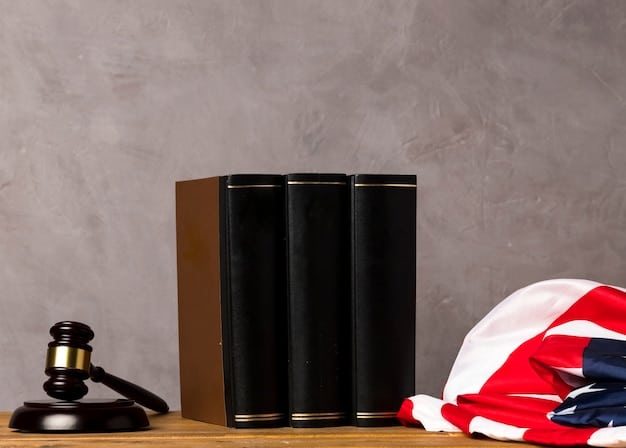
Beyond federal legislation, states might also react by enacting their own campaign finance reforms, creating a patchwork of regulations across the country. This decentralized legislative response can lead to complex legal challenges and varying standards of donor transparency and campaign spending. The legal battles that ensue from new regulations could redefine the boundaries of free speech and political participation, potentially leading to Supreme Court interventions that shape campaign finance law for decades to come.
Moreover, regulatory bodies, such as the Federal Election Commission (FEC), often respond to such investigations by increasing enforcement and clarifying existing rules. Even without new legislation, the heightened scrutiny from a major investigation can lead to a more aggressive posture from these oversight agencies, resulting in more penalties for non-compliance and a stronger emphasis on ethical conduct in political fundraising.
The collective effect of these legislative and regulatory shifts could be a significant rebalancing of power in the political arena. If successful, reforms could empower smaller campaigns and grassroots movements by leveling the financial playing field, or conversely, create new pathways for influence that may or may not be immediately apparent.
Impact on Voter Trust and Democratic Participation
Public trust in democratic institutions is a fragile commodity, heavily influenced by perceptions of fairness and integrity. An ongoing investigation into campaign finance reform, particularly if it uncovers systemic issues, can significantly erode voter trust in the political process. When citizens believe that elections are influenced by large sums of money or illicit deals, their faith in democratic outcomes dwindles.
This erosion of trust often manifests as increased cynicism towards politicians and political parties. Voters may feel their voices are marginalized in favor of wealthy donors or special interests, leading to disengagement from the political process. This disengagement can be reflected in lower voter turnout, less participation in civic activities, and a general apathy towards elections.
Consequences for Public Perception
- Heightened scrutiny of candidates’ financial backers and campaign contributions.
- Increased public demand for greater transparency in political fundraising.
- A potential shift in public opinion regarding the necessity of campaign finance reform.
- Decreased confidence in the fairness and integrity of election results.
Conversely, a transparent and thorough investigation, followed by effective reforms, could potentially restore some measure of public trust. If citizens perceive that accountability is being enforced and that steps are being taken to address corruption or undue influence, it could reinvigorate their belief in the democratic system. The challenge, however, lies in demonstrating that the investigation is not merely a political exercise but a genuine effort to uphold the integrity of elections.
The narrative surrounding the investigation also plays a crucial role. Media coverage, public discourse, and the responses of political leaders all shape public perception. If the investigation is framed as a necessary tool to clean up politics, it might garner public support. However, if it is perceived as partisan or politically motivated, it could deepen divisions and further alienate voters, regardless of its ultimate findings.
Ultimately, the long-term health of a democracy relies on the active and informed participation of its citizens. How an investigation into campaign finance impacts voter trust directly influences this participation, determining whether people feel empowered to engage or decide they are better off disengaging from a system they view as rigged.
Legal Precedents and Constitutional Challenges
Investigations into campaign finance reform often push the boundaries of existing legal interpretations, particularly concerning the First Amendment’s protection of free speech. The Supreme Court has repeatedly affirmed that money in politics can be considered a form of speech, leading to a complex interplay between protecting expressive rights and preventing corruption or the appearance of corruption.
Each new investigation, especially one that uncovers novel ways in which money influences politics, presents an opportunity for legal challenges that could redefine constitutional limits. Attorneys’ interpretation of campaign finance laws, and the courts’ rulings on these interpretations, become critical in shaping future regulations. The legal battles that emerge from an investigation can set new precedents for what is permissible in terms of political spending and disclosure.
Landmark Cases and Their Potential Influence
Past Supreme Court decisions, such as Buckley v. Valeo (1976) and Citizens United v. Federal Election Commission (2010), have significantly shaped the current landscape of campaign finance. Any new legislative or regulatory responses sparked by the ongoing investigation will inevitably be tested against these precedents. This could lead to a re-litigation of long-standing constitutional questions, potentially leading to new landmark decisions.
Moreover, the investigative process itself, including subpoenas, witness testimony, and evidence collection, can establish new protocols for how political financial crimes are prosecuted. The methods used by investigators and prosecutors in this current probe could become templates for future investigations, influencing the legal strategies of both government agencies and defense teams.
The complexity of campaign finance law means that even minor tweaks to regulations can have far-reaching legal ramifications. A ruling on one specific aspect of fundraising or spending could unravel broader principles, necessitating a thorough re-evaluation of how campaigns are funded and conducted. This legal uncertainty can, in turn, create a chilling effect among donors and campaigns, leading them to err on the side of extreme caution to avoid legal entanglements.
The legal landscape is dynamic, and ongoing investigations are often catalysts for its evolution. The specific charges brought, the defenses mounted, and the judicial outcomes will collectively contribute to a new chapter in American campaign finance law, with implications for all future elections.
Impact on Lobbying and Special Interest Groups
Lobbying and special interest groups play a significant, often controversial, role in American politics by influencing policy decisions and political outcomes. An investigation into campaign finance reform inevitably casts a spotlight on the relationship between these groups and elected officials. When the flow of money is scrutinized, the influence mechanisms of lobbyists come under intense review.
Should the investigation uncover illicit or unethical connections between campaign donations and policy outcomes, it could trigger a significant backlash against lobbying activities. This might lead to renewed calls for stricter regulations on lobbying, including greater transparency regarding lobbyist spending and access to lawmakers.
Changes in Lobbying Dynamics
- Increased public and media scrutiny of lobbying activities and their impact on legislation.
- Potential for stricter ethics rules and disclosure requirements for lobbyists.
- A shift in lobbying strategies, possibly favoring grassroots advocacy over direct financial contributions.
- Greater emphasis on compliance within lobbying firms to avoid legal pitfalls.

Special interest groups, particularly those heavily reliant on direct campaign contributions to advance their agendas, may find their traditional methods of influence curtailed. This forces them to adapt by exploring alternative avenues for advocacy, such as public awareness campaigns, direct voter engagement, or coalition building with other organizations. The shift might democratize influence to some extent, empowering groups that rely more on their membership base than on deep pockets.
Additionally, the investigation could expose vulnerabilities in existing lobbying regulations, leading to calls for comprehensive reform of the Lobbying Disclosure Act or other relevant statutes. This could mean more frequent reporting requirements, clearer definitions of what constitutes lobbying activity, and more severe penalties for non-compliance. The ultimate goal of such reforms would be to ensure that lobbying serves as a legitimate channel for advocacy, rather than a covert means of undue influence.
The overall effect could be a recalibration of power dynamics in Washington, D.C. If the investigation successfully curtails the more egregious examples of money’s influence, it could create a legislative environment where policy decisions are more directly responsive to public will rather than the financial interests of a select few. However, it also presents a significant challenge for advocacy groups to find new, legitimate ways to convey their messages to policymakers.
Future of Political Accountability and Oversight
The culmination of an investigation into campaign finance reform has profound implications for political accountability and the future of oversight mechanisms. When such a probe concludes, whether with indictments, legislative proposals, or clearer guidelines, it sets a precedent for how future instances of alleged financial impropriety will be handled. This process invariably reshapes the landscape of political ethics.
A key aspect of this is the strengthening of oversight bodies. Agencies like the Federal Election Commission (FEC) or the Department of Justice (DOJ) might receive increased funding, expanded mandates, or clearer authority to investigate and prosecute campaign finance violations. This could lead to a more robust enforcement environment, making it more difficult for individuals or campaigns to skirt existing laws without consequence.
Enhancing Oversight and Ethical Conduct
The investigation itself serves as a real-time case study, highlighting deficiencies in current laws or enforcement practices. Regulators and policymakers can learn from the challenges encountered during the probe, applying those lessons to design more effective oversight systems. This might include:
- Developing more sophisticated data analytics tools to track campaign contributions and expenditures.
- Creating inter-agency task forces to address complex financial crimes in politics.
- Establishing clearer ethical guidelines for candidates, political committees, and donors.
- Regular audits of political campaigns and party finances to ensure compliance.
Furthermore, the investigation’s outcome can influence public expectations of political behavior. If the probe results in significant consequences for those found to have violated campaign finance laws, it sends a strong message that such conduct will not be tolerated. This can foster a culture of greater accountability among political actors, encouraging them to operate with higher ethical standards.
Conversely, if the investigation yields minimal consequences or is perceived as a political witch hunt, it could undermine the credibility of oversight bodies and further entrench cynicism. The effectiveness of the investigation, therefore, is not just about its findings but also about its perceived impact on deterring future misconduct.
Ultimately, the ongoing investigation into campaign finance reform has the potential to fundamentally alter how political campaigns are funded, regulated, and perceived by the public, ensuring a more transparent and accountable democratic process, or, if mismanaged, deepen existing fissures in public trust.
| Key Area | Brief Consequence |
|---|---|
| 📊 Political Funding | Forces shifts from large donors to grassroots efforts due to heightened scrutiny. |
| ⚖️ Legislative Reform | 촉매 Provides impetus for new laws, disclosure rules, and public financing debates. |
| 🤝 Voter Trust | Can erode or restore public confidence, impacting participation rates. |
| 🏛️ Legal Precedents | May lead to new court rulings defining free speech and political finance. |
Frequently Asked Questions About Campaign Finance Investigations
Investigations are typically launched when there are allegations of illegal campaign contributions, undisclosed spending, or other violations of federal election laws. These probes aim to ensure fairness and transparency in political financing. They often stem from whistleblowers, media reports, or routine audits by regulatory bodies, ensuring that the integrity of democratic elections is maintained and upheld against potential corruption or undue influence.
Ongoing investigations can significantly disrupt campaigns by diverting resources to legal defense, damaging candidate reputations, and creating an atmosphere of uncertainty. Donors may become more cautious, and public perception of the campaign can be negatively affected, potentially impacting electoral outcomes. This can force candidates to adjust their messaging and focus on damage control rather than policy initiatives.
Yes, historically, significant campaign finance investigations have often been catalysts for new legislation or regulatory changes. Exposed loopholes or widespread abuses can create public and political pressure for reforms. These reforms aim to close gaps in existing laws, enhance transparency, and prevent future misconduct, altering the future landscape of political fundraising and expenditure.
“Dark money” refers to political spending where the source of the funds is not disclosed. This money often comes from non-profit organizations or super PACs not required to reveal their donors. Investigations frequently scrutinize dark money flows, given concerns about undisclosed influence and potential illegal coordination, as it obscures the true origin of substantial campaign contributions.
The long-term effects on voter confidence vary. If an investigation confirms systemic corruption but fails to lead to meaningful accountability or reform, trust can diminish. However, if it leads to transparent findings and concrete actions to address issues, it can help restore public faith in the electoral system’s integrity, encouraging greater civic engagement and participation in future elections.
Conclusion
The ongoing investigation into campaign finance reform in the U.S. is far more than a transient headline; it represents a critical juncture for American democracy. Its potential consequences ripple through every facet of the political system, from the immediate strategies of political parties and the legislative landscape to the fundamental trust citizens place in their government. While the full scope of its impact remains to be seen, history suggests that such probes serve as vital, albeit sometimes disruptive, mechanisms for accountability and, potentially, for refining the very rules by which power is sought and wielded. The outcomes of this investigation will undoubtedly inform debates on money in politics for years to come, shaping how campaigns are financed, how influence is exerted, and ultimately, how representative our democracy truly is.
